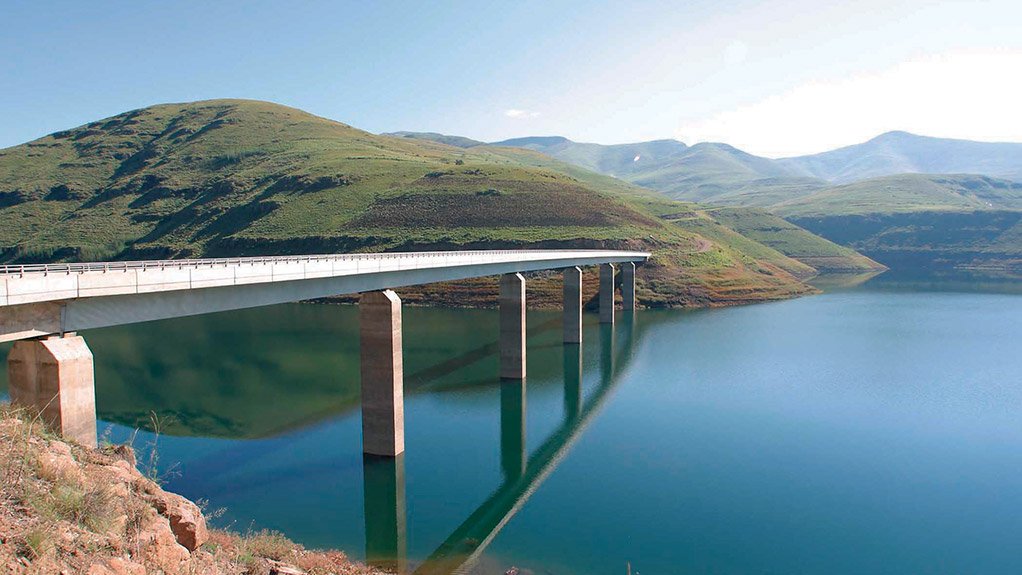Lesotho Highlands Development Authority (LHDA) reports that the engineering design contracts for the two main water-transfer components of the Lesotho Highlands Water Project Phase II will be awarded by mid-2017 and that construction should begin 18 months thereafter.
The R23-billion binational project is being financed by the Trans-Caledon Tunnel Authority, as mandated by the South African government, and will increase water supply from Lesotho to South Africa’s economic heartland of Gauteng. Phase II also includes a hydropower component, which is to be built in parallel to the transfer scheme and financed by Lesotho.
The development has been materially delayed from its initial 2020 completion date and is currently expected to be operational only in 2025.
The delay has been attributed to postponements in the ratification, in South Africa and Lesotho, of a 2011 Phase II agreement, as well as to several delays in finalising key policies, including the procurement policy. The deferral has been heavily criticised, particularly as the effects of South Africa’s worst drought in a generation have become apparent.
LHDA Phase II divisional manager Tente Tente acknowledged in an interview with Engineering News Online that progress had been slower than initially anticipated. However, he expressed confidence that the political, legal, policy, environmental and funding frameworks were now in place to support project implementation.
Several contracts for the design of associated infrastructure, such as roads, power lines, housing and village relocation, have already been awarded and the focus at the LHDA is currently shifting to the core water-transfer and hydropower contracts.
The key water-transfer components include the construction of the Polihali dam, downstream of the confluence of the Khubelu and Senqu (Orange) rivers, as well as a 38-km tunnel, connecting the Polihali dam to the Katse reservoir.
The Polihali dam is to the south-east of Phase I, which comprises the Katse and Mohale dams and associated transfer tunnels, which enables water to be conveyed from Lesotho into the Vaal system, which services 12-million people.
Tente reports that the deadline for responses to a request for proposals (RFP) for the Polihali dam is December 5, with four professional services JVs having been shortlisted during a prequalification phase for the design and construction supervision of the dam.
The deadline for a separate RFP for the professional services for the design and construction supervision of the Polihali transfer tunnel is January 9. Nine applicants participated in the prequalification phase, with three consortiums shortlisted to participate.
“The dam will be completed ahead of the tunnel,” Tente reports, adding tunnel boring machines will probably be employed at either end of the tunnel to accelerate construction.
Tente, who, in 2013, rejoined the LHDA, where he was employed as an engineer in training during Phase 1, argues that the groundwork is at last in place to ensure project progress.
“It’s not all doom and gloom,” he adds, while acknowledging the prevailing frustrations over the project’s delay.
He is convinced that, once the contracts are placed for the dam and the tunnel, the pace will accelerate and the revised timeframes will be met.
“Once the professionals are appointed, they will start to dictate the pace,” he asserts, adding that the designs for the dam and tunnel should be finalised by mid-2018. The construction phase is expected to begin in earnest during 2019.
Particular attention is currently being given to the relocation of the 2 500 people affected by the dam construction.
A total of 530 houses, across 17 villages, will be affected and Tente says every effort will be made to ensure that the relocation effort is handled with “sensitivity”. Consultations with affected communities will intensify during 2017 and relocation compensation has been fully factored in to the project budget.
Progress, he adds, is also being made on the 1 200 MW hydropower component, with a feasibility study scheduled for completion in mid-2018. The World Bank is providing grant funding and a consultant has been appointed to finalise the study, including whether the proposed pumped-storage scheme at Kobong is the best option.
“Once the study is completed, there will be a design phase and we expect to start construction in 2021. When the first water flows into South Africa in 2025, the hydro will be ready for commissioning,” Tente concludes.
Edited by: Creamer Media Reporter
EMAIL THIS ARTICLE SAVE THIS ARTICLE
To subscribe email subscriptions@creamermedia.co.za or click here
To advertise email advertising@creamermedia.co.za or click here













